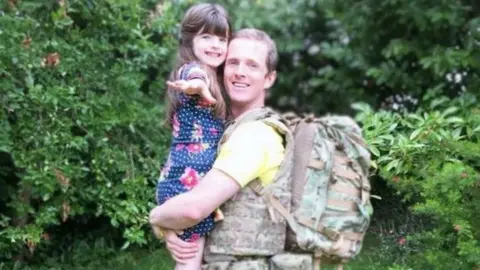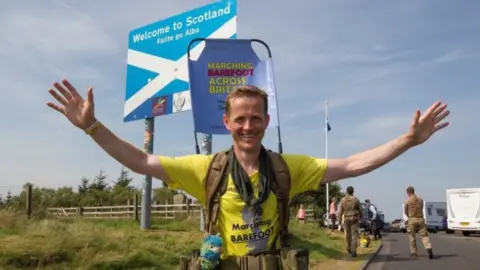Barefoot major finishes 700 mile walk for daughter
 Chris Brannigan
Chris BranniganAn army major has raised more than £560,000 for research into his young daughter's rare genetic disease, by completing a 700 mile barefoot walk.
Maj Chris Brannigan arrived at Edinburgh Castle at about 19:00 BST on 12 August having started his shoeless challenge in Lands End on 6 July.
His eight-year-old daughter Hasti has Cornelia de Lange Syndrome (CdLS) for which there is no cure nor treatment.
Maj Brannigan said the final stages had felt like "walking on glass".
He was cheered by onlookers and greeted by his family as he walked the final steps of his 1,126km journey and made a short speech to a crowd who had gathered to see his challenge completed.
'You've helped me'
"I've only done what anyone out there would have done for their child so I don't think I deserve any special recognition.
"If it was any of you I would have been out there walking with you and helping you the same way you've helped me," he said.
The officer is based at Tidworth Barracks in Wiltshire and the final days of his challenge were carried out in temperatures in excess of 30C.
"It's really, really hot. My feet are really bad. They are incredibly painful and it's a bit like walking on glass," he said.
 Hope for Hasti
Hope for HastiHasti was diagnosed with CdLS in 2018 and children with the condition often suffer from seizures and severe anxiety.
Fifth birthdays missed
Maj Brannigan said the challenge was also about raising awareness of children suffering from rare diseases and how he feels their treatment could be improved.
"I wanted to raise money for the first ever gene therapy for the condition [CdLS] but I'm also trying to raise awareness of rare diseases in the UK.
"There are 7,000 rare diseases in the world and 95 per cent have no treatment at all. One in three kids with rare diseases doesn't live to see their fifth birthday and those aren't first world figures.
"I think treatment needs to be a lot better in the UK," he added.
